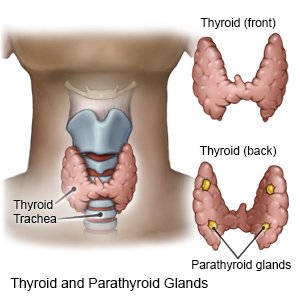Congenital Hypothyroidism in Children
Medically reviewed by Drugs.com. Last updated on Apr 6, 2025.
What is congenital hypothyroidism?
Congenital hypothyroidism is a condition that is present at birth. Your child may be born without a thyroid gland, or the thyroid gland may not make enough thyroid hormone. Thyroid hormones help control body temperature, heart rate, growth, and gaining or losing weight. Thyroid hormones play an important role in the normal growth and development of children.
 |
What increases my child's risk for congenital hypothyroidism?
- Family history of hypothyroidism or an autoimmune disease
- Certain medicines taken during pregnancy
- A genetic disorder or disease that causes hypothyroidism
- Low iodine levels
What are the signs and symptoms of congenital hypothyroidism?
Signs and symptoms of congenital hypothyroidism may be present shortly after birth or during infancy. Newborn babies may show no obvious signs and symptoms. During your child's first weeks of life, he or she may have a number of signs and symptoms. At ages 1 to 6 months, your child's signs and symptoms may become worse and more obvious.
- Early signs and symptoms:
- Bulging abdomen
- Low body temperature
- Larger than normal fontanelles (soft spots on the skull)
- Poor feeding
- Swelling of the eyelids, hands, or feet
- Yellowing of the skin and whites of the eyes
- Later signs and symptoms:
- Darkened, blotched, or dry skin
- Decreased activity and increased sleep
- Large tongue, hoarse crying, or trouble breathing
- Not able to gain weight
- Constipation
- Older children may be shorter than what is expected for their age
Drugs used to treat this and similar conditions
Synthroid
Synthroid (levothyroxine) treats hypothyroidism (low thyroid hormone) and different types of ...
Armour Thyroid
Armour Thyroid is used for hashimoto's disease, hypothyroidism, after thyroid removal, thyroid ...
Ozempic
Learn about Ozempic (semaglutide) for type 2 diabetes treatment, weight management, cardiovascular ...
Levoxyl
Levoxyl treats hypothyroidism (low thyroid hormone) and treats or prevents goiter. Learn about side ...
Cytomel
Cytomel is used for hypothyroidism, after thyroid removal, myxedema, myxedema coma, thyroid ...
Tirosint
Tirosint is used for hashimoto's disease, hypothyroidism, after thyroid removal, myxedema coma ...
Nature-Throid
Nature-Throid is used for hashimoto's disease, hypothyroidism, after thyroid removal, thyroid ...
Unithroid
Unithroid is used for hashimoto's disease, hypothyroidism, after thyroid removal, myxedema coma ...
Euthyrox
Euthyrox (levothyroxine) is used to treat hypothyroidism and to treat or prevent goiter. Includes ...
Liothyronine
Liothyronine systemic is used for hypothyroidism, after thyroid removal, myxedema, myxedema coma ...
How is congenital hypothyroidism diagnosed?
Your child's pediatrician will ask about your child's symptoms and examine him or her. The pediatrician will ask what medicines your child takes. You may also be asked about your child's medical history and if anyone in your family has hypothyroidism. Your child may have blood tests to check his or her thyroid hormone level.
How is congenital hypothyroidism treated?
Thyroid hormone medicine helps return your child's hormone level back to normal.
Treatment options
The following list of medications are related to or used in the treatment of this condition.
Call your local emergency number (911 in the US) if:
- Your child has choking episodes or sudden trouble breathing.
- Your child faints or has a seizure.
When should I call my child's pediatrician?
- Your child has swelling around the eyes, or in the legs, ankles, or feet.
- Your child becomes nervous or restless.
- Your child has diarrhea, tremors, or trouble sleeping.
- Your child has a fever.
- Your child has chills, a cough, or feels weak and achy.
- Your child's signs and symptoms return or become worse.
- Your child's skin is itchy, swollen, or has a rash.
- You have questions or concerns about your child's condition or care.
Care Agreement
You have the right to help plan your child's care. Learn about your child's health condition and how it may be treated. Discuss treatment options with your child's healthcare providers to decide what care you want for your child. The above information is an educational aid only. It is not intended as medical advice for individual conditions or treatments. Talk to your doctor, nurse or pharmacist before following any medical regimen to see if it is safe and effective for you.© Copyright Merative 2025 Information is for End User's use only and may not be sold, redistributed or otherwise used for commercial purposes.
Learn more about Congenital Hypothyroidism
Treatment options
Symptoms and treatments
Medicine.com guides (external)
Further information
Always consult your healthcare provider to ensure the information displayed on this page applies to your personal circumstances.
